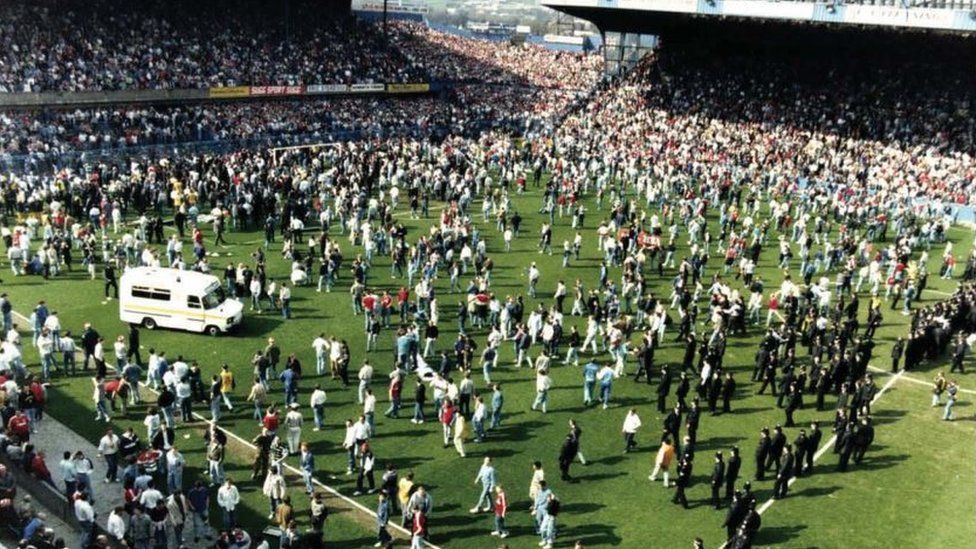Some clubs will trial designated safe standing areas before the end of the season, the BBC understands.

image sourceReuters
Plans to lift the ban on standing in the English Premier League and Championship are set to be announced by the government, the BBC has learned.
It is thought a handful of grounds will be able to use designated safe standing areas before the end of the season.
It would mean for the first time in over 25 years, fans of some top flight football clubs would be legally allowed to stand and watch their team play.
An official announcement is expected as soon as next month.
The chairman of the Football Supporters Association, Malcolm Clarke, said it was a “welcome” development that would benefit all fans.
He added: “People who want to stand should be able to do so in safety. Those who want to sit should be able to do so without having their view blocked.”
Since 1994, first and second tier grounds in England and Wales have been required to be all-seaters by law.
However, thousands of supporters continue to stand throughout matches.
In their 2019 general election manifesto, the Conservatives promised to work towards the introduction of safe standing areas, which have been embraced in the German Bundesliga, as well as in Scotland – where around 3,000 Celtic fans have been allowed to make use of a safe standing section since 2016.
Now, the BBC understands ministers will instructs the regulator, the Sports Ground Safety Authority (SGSA), to choose “early adopters” for the trials.
And while they are keen to proceed with caution, if the initial trials prove successful, the expectation is legislation would be widened out to cover all stadiums in England’s top two divisions within the next few years.
A spokesperson for the Sports Ground Safety Authority said: “We are working closely with the government on planning the next steps for implementing this manifesto commitment.”
Both Labour and the Liberal Democrats also went into the last election with a pledge to update the legislation that was introduced in the wake of the Hillsborough disaster in 1989, which led to the deaths of 97 Liverpool fans.
As a result, the relatives of the Hillsborough victims have had long-term concerns about standing in football grounds.
But Margaret Aspinall, whose son died as a result of Hillsborough, now accepts the arguments for a change in legislation.
She said: “People’s opinions have changed. You’ve got to move forward with the times.”

image sourceHillsborough Inquests
In anticipation of the change in legislation, Manchester United, Manchester City, Liverpool and Chelsea have all installed rail seating over the summer.
The clubs had all been identified by the SGSA as having a problem with persistent standing.
The new seats are incorporated into a waist high rail for the supporters behind to lean on.
This means supporters who prefer to stay on their feet occupy the same amount of space as those that would rather sit, avoiding any danger of overcrowding.
Liverpool invited Ms Aspinall and other Hillsborough relatives to see the new rail seats in the Kop end of the Anfield football ground earlier this month and the families are now largely on board with the initiative.
But there are concerns the plans don’t go far enough.
Labour MP Alex Norris, who is the vice-chair of the All Parliamentary Group for Football Supporters, backs safe standing but believes it should not be confined to the home team’s seating areas.
He added: “I’ve never sat down at an away ground. This alone won’t solve the problem.”
It is understood that Premier League and Championship clubs will be invited to register an interest to be part of the trial in the coming months.
But clubs that have already installed rail seating aren’t guaranteed to be selected.
Those that are successful will be granted updated licences that would only allow standing in specially designated areas – which would not require a major legislative change.
Surveys show that safe standing is overwhelmingly popular among football fans.
The FSA’s Mr Clarke said: “The safety and customer care arguments have been won. We would urge the Department of Culture, Media and Sport to proceed as soon as possible.”
In an interview in the Times, Culture Secretary Oliver Dowden said: “It’s the sensible thing to do because fans are standing all the way through [games] anyway and you can do it in a safer way.
“We’ve got terrible experience in the past and more recent experience with things like the Euros, which just means we need to make sure we get this right.
“We’re engaging with the police and others, but we’ll get to the stage this season where we’ll see safe-standing, at least in pilot form.”